Digital devices dominate every moment of daily life, and the idea of stepping away from screens for a full week may sound radical. However, a growing number of wellness experts and neuroscientists are highlighting the profound mental and emotional benefits of unplugging, even for just seven days. A digital detox, defined as a period of intentional disconnection from phones, computers, social media, and streaming services, can offer a reset for the mind and body that few other habits can match.
The First Day: Withdrawal Symptoms and Mental Clutter
The early hours of a digital detox can be surprisingly challenging. Many individuals experience a strong urge to reach for their phones, even when there’s no real reason to do so. This behavior is more than just a habit; it’s a chemical response. Smartphones and social media platforms are designed to trigger dopamine release in the brain, creating a reward loop not unlike addiction.
When the dopamine tap is turned off, people may experience restlessness, irritability, or anxiety. The brain, so accustomed to constant stimulation, initially struggles with the absence of information and distraction. This uncomfortable transition, however, is an essential first step toward mental clarity.
Day 2-3: Clarity Begins to Emerge
After the initial withdrawal fades, the brain begins to adjust. Without the constant buzz of notifications and the flood of digital content, cognitive functions start to recalibrate. Thoughts become more coherent, and the mind can engage in deeper, more uninterrupted reflection.
Many people report enhanced sensory awareness during this stage. Simple experiences, such as sipping morning coffee, walking outdoors, or listening to ambient sounds, feel richer and more grounded. These shifts align with findings in neuroscience showing that constant digital multitasking can impair the brain’s ability to focus and process information deeply. A detox gives the brain room to repair and reset.
Reconnecting With Self: Mental Stillness and Emotional Insight
As the days go on, individuals often find themselves reconnecting with their inner world. Without external distractions, the mind begins to explore thoughts and feelings that have long been buried under the noise of the digital world. Journaling, meditation, and even quiet contemplation become more natural and rewarding.
This period often leads to moments of insight and emotional release. Freed from the expectations and comparisons fed by social media, people start to ask deeper questions: What brings genuine joy? What matters most? In many cases, these realizations lead to positive behavioral changes and greater self-awareness.
Rediscovering Boredom and Creativity
Around days five and six, something unexpected tends to occur: boredom returns. But instead of being something to avoid, boredom becomes a source of creative energy. Without screens to provide constant stimulation, the mind begins to wander in productive ways. New ideas emerge. Old hobbies resurface. People engage in activities they may have long abandoned—reading, sketching, cooking, or simply playing.
This is no coincidence. Neuroscientific research shows that the brain’s “default mode network,” which activates during periods of rest and boredom, is crucial for creativity, introspection, and memory consolidation. Far from being idle, the brain is doing important internal work.
By Day 7: A Mental and Emotional Reset
By the end of a seven-day detox, many report feeling calmer, more focused, and emotionally grounded. The constant pressure to perform, respond, and engage fades, replaced by a more deliberate, present-centered way of being. Sleep improves. Stress levels drop. Conversations feel more meaningful.
The return to digital life after a detox tends to be more intentional. People find themselves less reactive, more discerning about how they use their devices, and less tethered to the constant pull of notifications. It becomes easier to maintain boundaries, such as checking emails only during set hours or turning off unnecessary alerts.
The Science Behind the Benefits
Scientific studies support the anecdotal reports of those who have completed digital detoxes:
- Reduced stress: Researchers have found that taking a break from social media for just one week can significantly lower cortisol levels.
- Improved cognitive function: Time away from screens has been linked to better concentration and memory retention.
- Enhanced emotional well-being: Individuals often experience decreased anxiety, improved mood, and greater satisfaction with life when they reduce screen time.
- Better sleep: Without the interference of blue light and late-night scrolling, the body’s natural sleep cycles can be regulated more effectively.
Practical Tips for Trying a Digital Detox
Embarking on a digital detox doesn’t require a cabin in the woods or a complete lifestyle overhaul. Here are a few practical steps to get started:
- Set clear rules. Decide what the detox includes—social media only, or all screens? Will work-related communication be allowed?
- Inform others. Let friends and colleagues know about the detox in advance to set expectations and avoid misunderstandings.
- Prepare offline activities. Stock up on books, journals, board games, or creative supplies to fill the time usually spent online.
- Expect discomfort. Understand that some resistance is natural, especially in the first few days.
- Reflect and replace. Use the time to journal or meditate. Replace screen time with meaningful alternatives like walks, conversations, or hobbies.
A Healthier Relationship With Technology
A seven-day digital detox is not about rejecting technology altogether. It’s about resetting the relationship with devices so that technology serves rather than controls. Modern life may require regular online engagement, but living online 24/7 is not a requirement for success or happiness.
Periodic disconnection can help restore balance, renew mental clarity, and nurture a deeper sense of self. In a world that moves fast and demands constant availability, taking time offline may be one of the most radical acts of self-care, and one of the most necessary.


